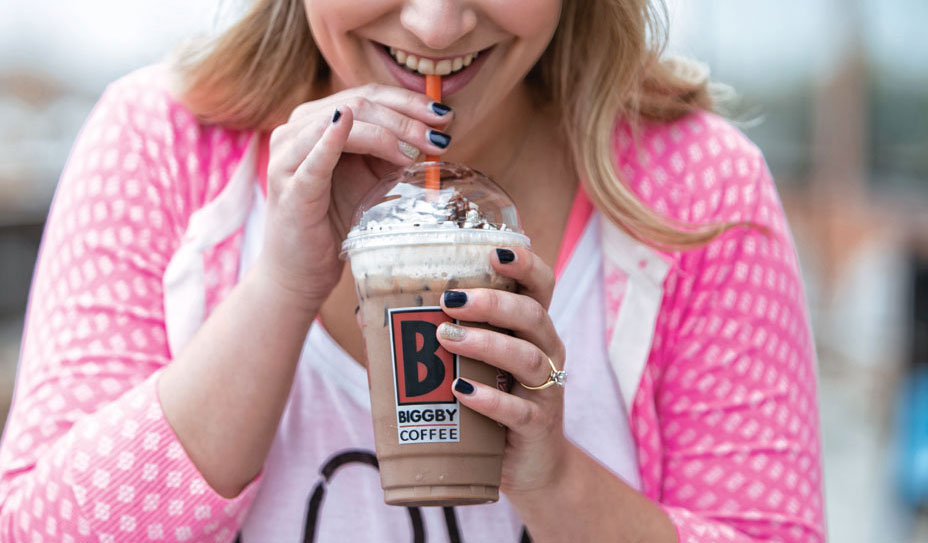Michigan-based franchise Biggby Coffee adapted its service model just like every other restaurant in America after the coronavirus outbreak. It shut down lobbies, prioritized drive-thru service and other off-premises tactics, and ramped up its digital capabilities. It also doubled down on its franchise community, working arm-in-arm with operators to develop new ideas and adapt the operation according to their needs.
For some businesses, these kinds of changes have been enough to just survive the pandemic. For Biggby, they’ve helped the brand accelerate growth and prepare for their prototype of the future, all while building a new consumer base.
Biggby co-CEO Mike McFall says the company—which has 240-plus locations in 11 states—has over 100 franchise owners, and with that many people fighting to keep their businesses afloat, a number of “extraordinary” ideas have emerged.
“There were all kinds of amazing ideas that came out of our franchise community,” McFall says. “Somebody designed a tennis racket where the cup could sit inside of a vessel in the tennis racket, and then they would hand the cup out through the drive-thru window and the customer would take the cup off the tennis racket.”
McFall says that he and his business partner, co-CEO Bob Fish, communicated with franchisees through daily town halls early in the pandemic, and with customers via online letters and “Ask Me Anything” forums. Not only has that helped keep the system engaged and up to date on any changes affecting the business, but it’s also maintained the company’s growth momentum. Biggby has continued to open new locations through the crisis, and even signed franchise agreements.
To better set franchisees up for success, Biggby’s leadership team also expedited an online ordering platform that was already in the works; McFall says it’s set to roll out soon, and probably wouldn’t have gone live until 2021 if it weren’t for the pandemic. The company also partnered with third-party delivery services for the first time.
He says Biggby’s active and supportive approach through the pandemic will pay dividends as the brand continues to grow and seek new franchise partners. The leaders are proving they can be supportive through even the most challenging times, and prospective franchisees will learn about that as they research the opportunity.
“When somebody is thinking about whether they should or shouldn’t become part of a brand, one of the considerations is, when I make the investment, are they going to take care of me?” McFall says. “And so when this whole thing hit, it was a full on effort by our team, and I think that we’re going to come out of this with a much stronger relationship with our franchise owners.”
Also setting Biggby up for success? The wave of new customers who are discovering the brand for the first time. Biggby’s sales took a significant hit in late March as the broader industry suffered from scared customers and uncertainty surrounding the virus, but the company was able to quickly rebound with help from an unlikely culprit: Starbucks.
“The fact that all the Starbucks closed really helped us,” McFall says, noting the fact that Starbucks shut down all cafes outside of delivery and drive-thru service. “I can’t deny the fact that Starbucks’ shutdown was really, really powerful.” He says many Starbucks regulars looking for a new go-to coffee spot found it in Biggby, and many of them likely won’t go back.
Thankfully for Biggby, coffee isn’t a luxury but a necessity, meaning people get it in good times and bad. McFall says Biggby “breezed through the Great Recession like it didn’t even exist,” and he thinks that positions the brand well for whatever comes after the coronavirus, even if it’s a prolonged recession.
Still, the reality of the COVID-19 outbreak is that it will have a long-term effect on how consumers choose to interact with their favorite foodservice brands. That’s why Biggby is going to prioritize drive-thru locations moving forward, McFall says. It’s even designed a modular drive-thru-only prototype that’s completely built out in Michigan and then shipped to its final location via two semi trucks.
“There’s a crane there, it lifts [the parts] off, they bolt them down, they turn the electricity on, and they’re serving coffee within 48 hours,” he says. “This modular drive thru is extraordinarily innovative. And what we’ve seen in the last six to eight weeks is that the drive-thru-only [locations] are doing substantially more revenue than even before this. And so I think that’s going to be something that people are going to want to learn more about and pay attention to.”
For more from McFall on Biggby’s efforts through the coronavirus, stream the podcast above.

